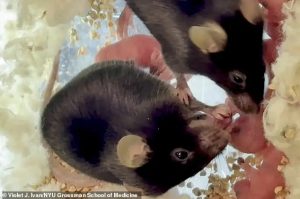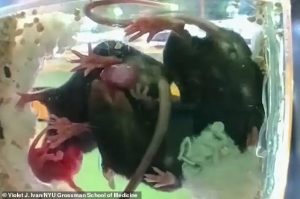Key Takeaways
- Experienced female mice act as ‘midwives’ during difficult births
- Survival rates jump from near zero to 90% with assistance
- First documented case of such behavior in non-primate animals
- Motherhood experience is crucial for effective assistance
In a groundbreaking discovery, researchers have found that mice provide midwife-like assistance during difficult births, dramatically improving survival rates for both mothers and pups. This represents the first documented case of such behavior in non-primate animals.
Mouse Midwives in Action
Researchers at NYU Langone Health genetically engineered pregnant mice to lack oxytocin, a hormone crucial for triggering contractions. Without strong contractions, pups became stuck in the birth canal, threatening both mother and offspring.
The study placed 17 pregnant mice in cages—some alone and some with experienced female companions who had previously given birth. The experienced mice stepped in when pups became stuck, using their mouths and paws to extract the newborns before cleaning them.
Professor Robert Froemke explained: “She will come over and act like a little mouse midwife and very carefully, with her mouth and her paws, pull the pup out.”
Dramatic Survival Improvement
The assistance proved crucial. Survival chances jumped from nearly zero for both mother and pup in the no-assistance group to 90 percent in the midwife group. The findings were reported at the Society for Neuroscience annual meeting in San Diego.
Professor Froemke noted: “There are a lot of reasons mammals are social, and a primary reason is to help each other out, especially in these really vulnerable periods.”
Experience Matters
Further testing revealed that only experienced mother mice could provide effective assistance. When researchers paired pregnant females with male mice or females who had never given birth, results were different.
While 50-60 percent of mouse mothers survived giving birth across both groups, none of the pups survived. The assistant mice applied abdominal pressure but didn’t know to break open the fluid-filled sacs encasing newborns—a vital step to allow breathing.
“It seems the experience of being a mother is required to be a successful [mouse] midwife,” Professor Froemke concluded.
Broader Implications
The conference abstract highlighted “the critical role of experienced maternal support in childbirth” and the benefits of midwife-like behaviors during difficult labor.
These findings, combined with previous observations of mice providing first aid, suggest caregiving may be more common in the species than previously thought. Earlier research showed rodents instinctively helping unconscious companions by clearing airways and accelerating recovery.
The study underscores how social behaviors extend across mammalian species, with mice demonstrating remarkable caregiving instincts during critical life events.






